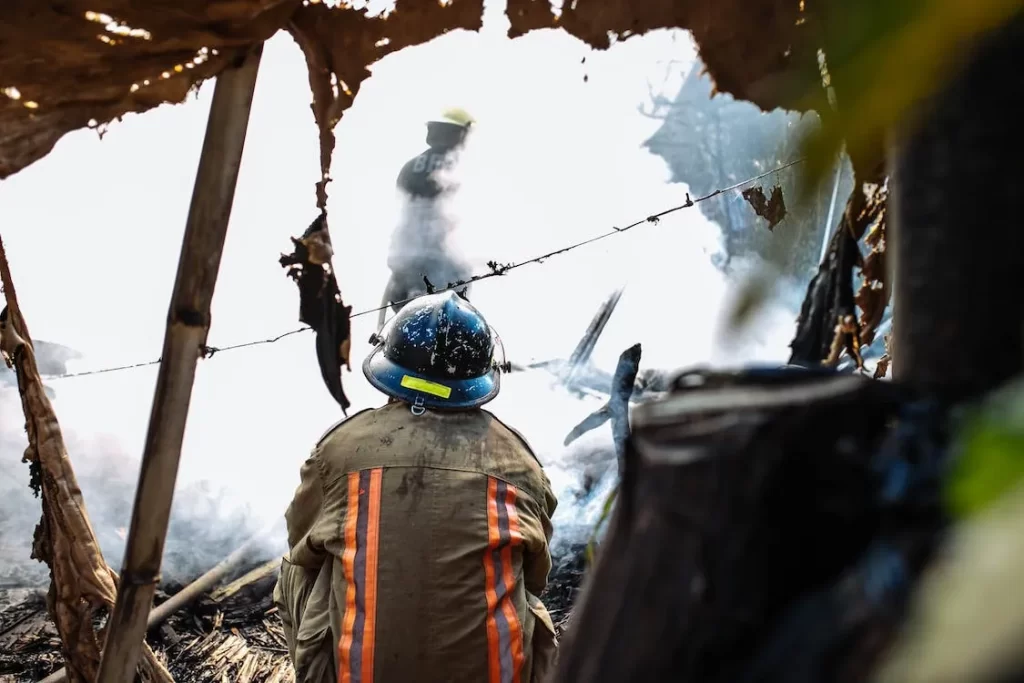
Image Credit: pexels.com
You see, being a firefighter isn’t just about putting out flames and saving cute kittens from trees. It’s a challenging and sometimes perilous job that involves facing a range of health hazards head-on.
In 2020 alone, there were 331,407 state and local firefighters in the United States, all working tirelessly to keep everyone safe. However, taking on this role means confronting numerous health risks.
To spread awareness and educate, this article sheds light on the health challenges every firefighter encounters. From confronting cardiac arrests to mental health challenges, there are numerous other challenges you may face.
Cardiac Arrest
You might not realize it, but the heroic efforts of firefighters like you come at a cost. The intense physical exertion, often under extreme conditions, puts you at risk of cardiac arrest. It’s a sudden, life-threatening condition that demands immediate attention.
Climbing ladders, carrying heavy equipment, and battling blazes elevate your heart rate and blood pressure. Over time, this strain can contribute to the development of cardiovascular issues.
The adrenaline rush you experience during emergency responses can further impact your heart health. Sudden spikes in adrenaline can disrupt your heart’s rhythm, potentially leading to arrhythmias or even cardiac arrest. You need to recognize the signs of heart trouble and prioritize regular health check-ups to safeguard yourself.
Firefighters frequently endanger themselves in perilous situations, yet most duty-related deaths aren’t tied to fire or smoke inhalation. Instead, around 40% of fatalities while on duty result from sudden cardiac arrest. In 2022, sudden cardiac death tragically took the lives of 36 on-duty firefighters, as reported by the National Fire Protection Association.
To ensure public safety, you must also prioritize your own well-being. Stay active with regular workouts and adopt a diet that’s good for your heart. Make sure you’re aware of the red flags of cardiac issues, like chest discomfort, breathlessness, or feeling lightheaded. By taking proactive steps, you can continue your life-saving mission while minimizing the risk of cardiac complications.
Cancer
Exposure to toxic substances and carcinogens, often encountered while fighting fires, increases your vulnerability to various types of cancer. Whether it’s inhaling noxious fumes or absorbing harmful particles through your skin, the risks are real and demand your vigilant attention.
Your protective gear acts as a shield, but it’s not foolproof. These hazardous substances can find their way into your equipment or clothing, increasing the potential for long-term health repercussions. Regular decontamination and proper hygiene practices are your allies in minimizing these risks.
To extinguish fires, Aqueous Film-Forming Foam (AFFF firefighting foam) is a common tool employed by firefighters. However, its usage has been linked to the development of diverse forms of cancer, as noted by TorHoerman Law. Prolonged exposure to AFFF has been linked to prostate cancer, pancreatic cancer, and other forms of cancer.
Consequently, a significant number of firefighters have taken legal action by filing an AFFF foam lawsuit. The grave health risks have prompted these individuals to seek justice and compensation for the challenges they now face. These lawsuits reflect the urgency of addressing the adverse consequences of exposure to AFFF firefighting foam.
Screenings and early detection become important weapons in your arsenal against cancer. Periodic medical check-ups and health assessments can help identify any signs of malignancy, enabling timely intervention. By understanding preventive measures, you can confront this peril head-on while continuing to safeguard your community.
Traumatic Injuries
From falls and trips to strains and fractures, every call you respond to carries the potential for physical harm. Maneuvering through unpredictable environments, often obscured by smoke and debris, requires your utmost vigilance.
Swift and precise movements are essential, but they can also lead to accidents. The heavy equipment you handle and the demanding tasks you undertake underscore the need for protective gear and meticulous training.
Addressing traumatic injuries involves more than immediate care. Recovery and rehabilitation are essential, ensuring you’re ready, both physically and mentally, to stand at the frontline of life and property protection once more.
According to data, 33 firefighters lost their lives to trauma-related fatalities in 2022. It included 20 instances of internal trauma deaths and six fatalities from crushing incidents. It also included five lives claimed by unspecified traumatic injuries and two deaths caused by gunshot injuries or projectile wounds.
The risks you face emphasize the importance of rigorous training, vigilant protocols, and consistent use of protective measures. Amidst these hidden challenges, remember your commitment to safeguarding lives includes both the communities you serve and your own well-being.
Mental Health Challenges
The relentless exposure to traumatic incidents takes a toll on your psyche, potentially leading to anxiety, depression, and post-traumatic stress.
Shift work and high-stress situations disrupt your sleep and routine, exacerbating mental strain. It’s vital to prioritize self-care, nurturing your emotional well-being through outlets like counseling and peer support.
Recognizing the signs of mental distress is pivotal. Mood swings, withdrawal, or irritability are signals. Just as you rush to extinguish fires, address your mental health with equal urgency, forging a path towards resilience and healing.
According to the National Fallen Firefighters Foundation, annual firefighter suicides, numbering 100 to 200 deaths, are double the rate of the general population. This distressing statistic reveals the dark reality of being in this profession. It also highlights the urgent need for comprehensive support and resources within the firefighting community.
Summing Up
In the pursuit of safeguarding communities, you confront a multitude of health hazards that often remain unseen. The sacrifices in your line of duty can expose you to cardiac risks, cancer, injuries, and mental health challenges.
As you selflessly rush to protect lives and property, it’s important to remember that your health and safety matter just as much. Amidst the challenges mentioned here, you should take every measure to protect your health.







